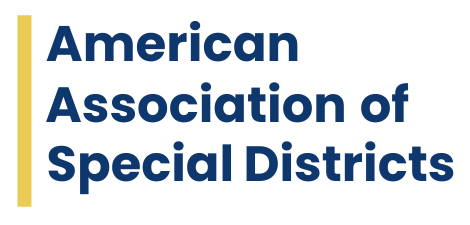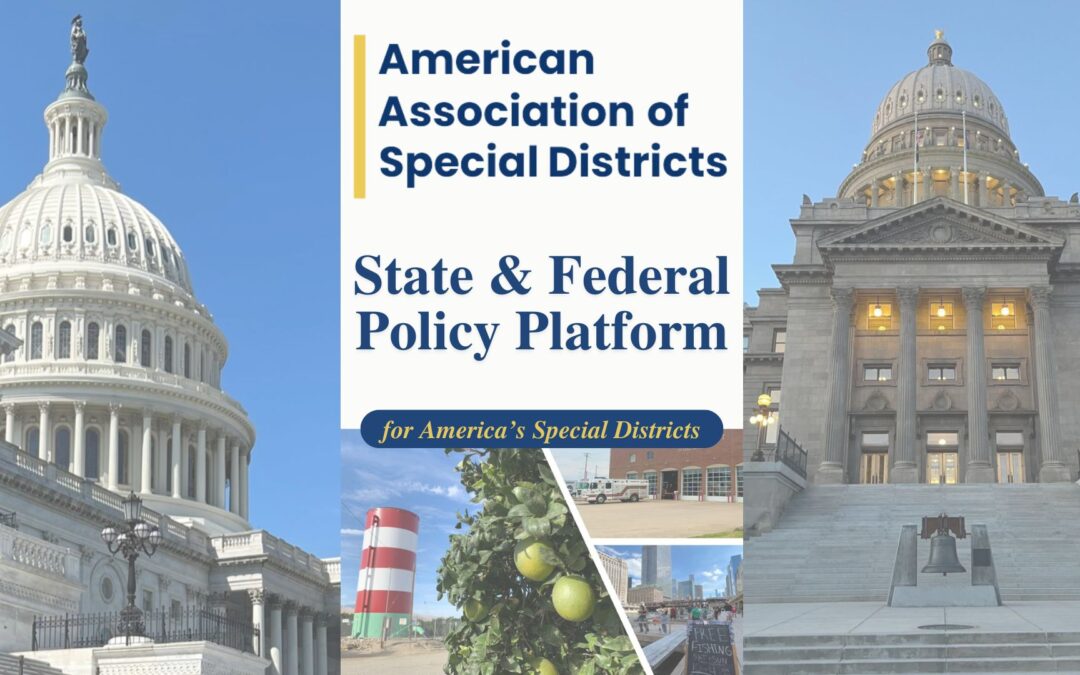The American Association of Special Districts (AASD) established Wednesday its State and Federal Policy Platform and adopted founding policy priorities to advance and strengthen America’s 35,000+ special districts through a focused set of advocacy goals uniting all types of districts.
The Platform is a “living document” and guides how AASD invests its advocacy resources to assist/advance its membership, and directs how AASD can serve to be a primary resource for development of state special districts associations. Further, the Association will program governance education and topical webinars with attention to the Platform.
AASD’s Policy Platform reflects the Association’s priorities of state coalition development, outlining “pillar issues” for rallying special districts together on common issues in their state capitals – with outreach priorities on states where organizations representing special districts and their governance needs do not exist… yet.
Adopted policy statements also play a role in how the Association position itself to support existing state special district organizations, who are AASD Members, on policy issues with trending and broader special district implications.
AASD’s Advocacy & Coalition Development Committee (ACDC) selected early primary policy matters after vetting a range of trending public policy issues that broadly impact the governance environment of multiple types of special districts across the country in its first meeting on December 16.
These founding priorities include:
- Preserving local control for special districts and education states’ officials on the importance of special district services.
- Fostering common sense and standardized local government reporting standards in states.
- Protecting local revenues, bond capacity, and alternative funding sources to sustain public services.
- Ensuring necessary intergovernmental collaboration on significant public works projects, community services, and more that could otherwise financially impact a special district.
- Mitigating unintended consequences and impacts of enterprise zones and similar special tax benefit structures.
- Advocating for responsible consolidation processes (in the spirit of local, community control).
- Endorsing practical audit thresholds mindful for the full spectrum of local government services.
- Promoting ethics and governance education among special district and fellow local government officials alike.
With state development and additional attention to public policy matters, AASD recognizes the necessity for special district leaders and stakeholders to understand the federal landscape on major policy issues that could impact the districts’ “governance environment” and ability to provide robust, high-quality public services in their communities.
Accordingly, AASD monitors major federal regulatory and legislative issues that stand to positively or negatively impact the special districts across the country.With exceptions, AASD does not intend play to play a direct(*) role in federal lobbying activity.
AASD’s federal policy program will be focused on keeping special districts informed of federal issues of stated importance; guiding how and when AASD joins with other national stakeholders in support or opposition of key issues; and prescribes when AASD provides necessary resources for districts to take grassroots action on federal issues.
- Federally defining “Special District”(*) and ensuring special districts are placed on a more level playing field to access federally-sourced programs.
- Reforming and streamlining the Census of Government(*) to make sure special district service are accurately represented in federal data gleaned on local government services.
- Recognizing special districts as a geographic unit of government(*), which is a regulatory issue impacting special districts’ ability to certify household and population figures for the communities they serve.
- Ensuring hazard mitigation programs are robust and individually foster special district programs.
- Focusing on PFAS as a hazardous substance: advocating for district liability, compliance resources, and awareness of the issue among members.
- Securing fairness in the red dye diesel standard exemption, extending the perk offered to school districts to include non-educational special districts.
- Mitigating impacts of the Lead & Copper Rule.
AASD looks forward to advancing special districts’ through strength in advocacy with their state and federal stakeholders in 2025.
Jonathan Roach, AASD Region V Board Member (Roach & Associates, PLLC), serves as the ACDC Chair.
Interested in joining the grassroots movement for America’s districts? Strive to be engaged in matters that impact your district services? Contact Cole Arreola-Karr, AASD Executive Director, at contact@americasdistricts.org to get involved with AASD.

